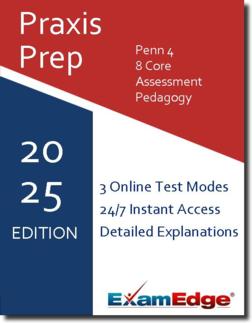Praxis Penn 4-8 Core Assessment Pedagogy (5153) Practice Tests & Test Prep by Exam Edge - Topics
Based on 22 Reviews
- Real Exam Simulation: Timed questions and matching content build comfort for your Praxis Penn 4-8 Core Assessment Pedagogy test day.
- Instant, 24/7 Access: Web-based Praxis Pennsylvania Grades 4-8 Core Assessment Pedagogy practice exams with no software needed.
- Clear Explanations: Step-by-step answers and explanations for your Praxis exam to strengthen understanding.
- Boosted Confidence: Reduces anxiety and improves test-taking skills to ace your Praxis Pennsylvania Grades 4-8 Core Assessment Pedagogy (5153).

Understanding the exact breakdown of the Praxis Pennsylvania Grades 4-8 Core Assessment Pedagogy test will help you know what to expect and how to most effectively prepare. The Praxis Pennsylvania Grades 4-8 Core Assessment Pedagogy has 70 multiple-choice questions The exam will be broken down into the sections below:
| Praxis Pennsylvania Grades 4-8 Core Assessment Pedagogy Exam Blueprint | ||
|---|---|---|
| Domain Name | % | Number of Questions |
| Adolescents as Learners | 25% | 18 |
| Curriculum and Instruction | 30% | 21 |
| Assessment | 20% | 14 |
| Professionalism | 25% | 18 |


